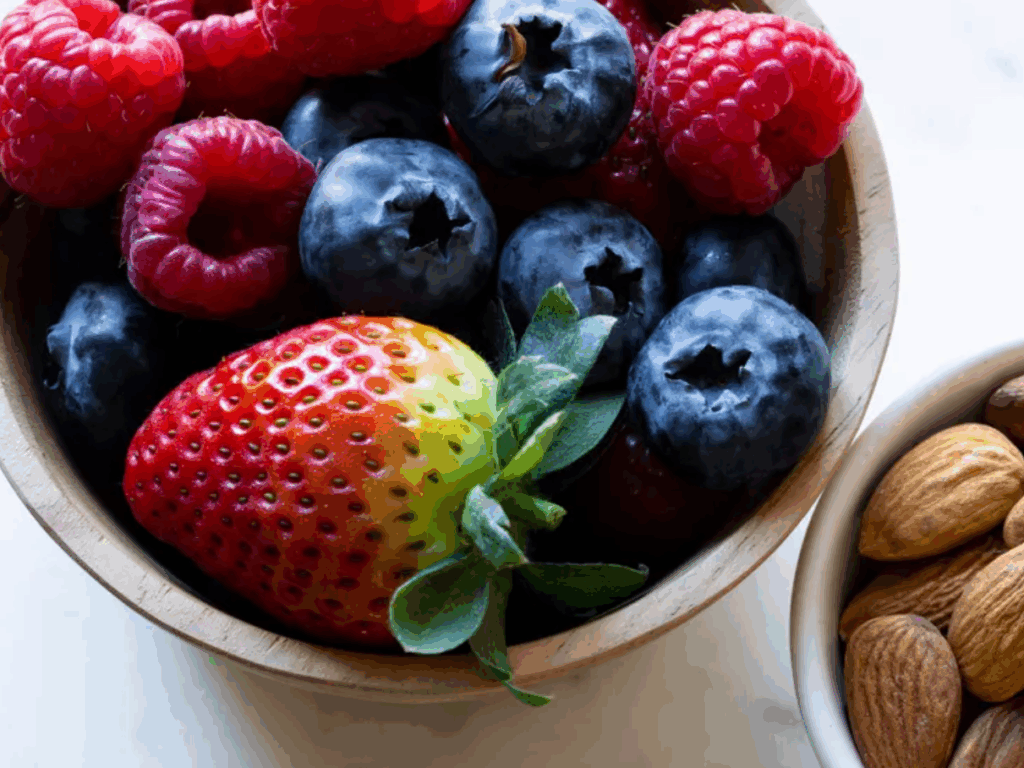If you live with eczema, you probably already know that certain foods—think peanuts, dairy, or shellfish—can make flare-ups worse. But what’s less obvious is that even seemingly healthy foods could be fueling that itch.
Nutritionist Karen Fischer, author of The Eczema Diet, has identified what she calls “the itchy dozen,” a list of foods that often aggravate eczema. She’s seen longtime sufferers—some dealing with symptoms for decades—finally find relief by cutting these foods out.
To better understand how diet affects eczema, we also spoke with a registered dietitian and nutritionist. Here’s what to know about potential food triggers, safe alternatives, and the eating habits that may help calm your skin.
How Food Impacts Your Skin
Most of us have felt the aftermath of a weekend packed with takeout, wine, and sugar—the skin dulls, breakouts surface, and inflammation rises. For people with eczema, that connection can be even more dramatic.

“Diet can play a significant role in the overall health of our skin,” explains Melissa Perry, RD, of Orlando Health. “Identifying food triggers and reducing inflammation can help minimize eczema symptoms. A diet rich in whole foods and low in processed ingredients supports gut health and strengthens the immune system, which in turn helps the skin.”
Food Sensitivity vs. Allergy
It’s important to note the difference: sensitivities may cause bloating, itching, or discomfort, while food allergies involve the immune system and can be far more serious. If you notice your eczema flaring after meals, talk to a doctor or allergist before self-diagnosing.
Foods That May Help Calm Eczema
Not all foods are foes—some can actually soothe inflammation and support skin repair. Here are a few worth adding to your plate:
- Bananas: Their high potassium content makes them skin-friendly.
- Seeds (sunflower, almonds): Excellent sources of vitamin E, an antioxidant that helps with immune function and swelling.
- Beef or chicken broth: Both provide glycine, an amino acid that supports skin healing.
- Bell peppers, strawberries, cauliflower: Packed with vitamin C, which is crucial for collagen production.
- Flaxseed oil: Nourishes dry skin from the inside out.
- Oats: Contain vitamin E, zinc, and silica to strengthen skin.
- Salmon: Rich in omega-3s, known for their anti-inflammatory properties.
- Red cabbage: Naturally alkalizing and calming for inflammation.
- Turmeric: A proven anti-inflammatory; pair it with black pepper to boost absorption.
- Oatmeal: Fiber-rich, supporting gut health and immunity.
- Blueberries: High in quercetin, a plant flavonoid with antioxidant power.
Foods That May Trigger Flare-Ups
On the flip side, some foods—even healthy ones—can worsen eczema in sensitive individuals. According to Fischer, here are common culprits:
- Avocado: Full of itch-promoting salicylates.
- Cruciferous greens (broccoli, spinach, kale): Surprisingly high in amines and salicylates that can worsen itching.
- Dried fruit: Contains sulfites, MSG, and other irritating compounds.
- Oranges and orange juice: Acidic and rich in salicylates.
- Tomatoes: A triple whammy of salicylates, amines, and natural MSG.
- Dairy products: Both an allergen and a potential inflammation trigger.
- Grapes: Another acid-heavy fruit linked to itchiness.
- Soy products (including soy sauce): Contain MSG and amines.
- Eggs: Linked in some studies to eczema flare-ups.
- Wheat and peanuts: Both shown in research to be common dietary triggers.
The tricky part? Not everyone reacts the same way. A food that sparks itching in one person may be harmless for another, which is why keeping a food diary can help identify your personal triggers.
Should You Try an Elimination Diet?
Elimination diets—where you temporarily cut out suspected triggers—can help, but they must be approached carefully. Removing too many foods at once can lead to nutrient gaps.
Perry advises focusing on whole, minimally processed foods while cutting back on fried snacks, sugary treats, and processed items that promote inflammation. Working with a healthcare provider or allergist is the safest way to test for food triggers.
Do Any Diets Work Best for Eczema?
There’s no universal “eczema diet,” but anti-inflammatory eating patterns tend to help. Perry often recommends the Mediterranean diet, which emphasizes fruits, vegetables, whole grains, and omega-3-rich foods like salmon and walnuts.
“Diet may influence the inflammation associated with eczema flare-ups,” she says. “Focusing on antioxidant-rich and anti-inflammatory foods can support healthier skin.”
The Takeaway
Managing eczema often requires a multi-pronged approach, and diet can be a powerful tool in your arsenal. While no plan works for everyone, identifying your personal food triggers—and filling your plate with anti-inflammatory, nutrient-dense foods—may reduce flare-ups and support clearer skin.
Before making major dietary changes, consult with a doctor or dietitian to ensure you’re getting the nutrients your body needs. Your path to calmer, healthier skin may start in the kitchen.
